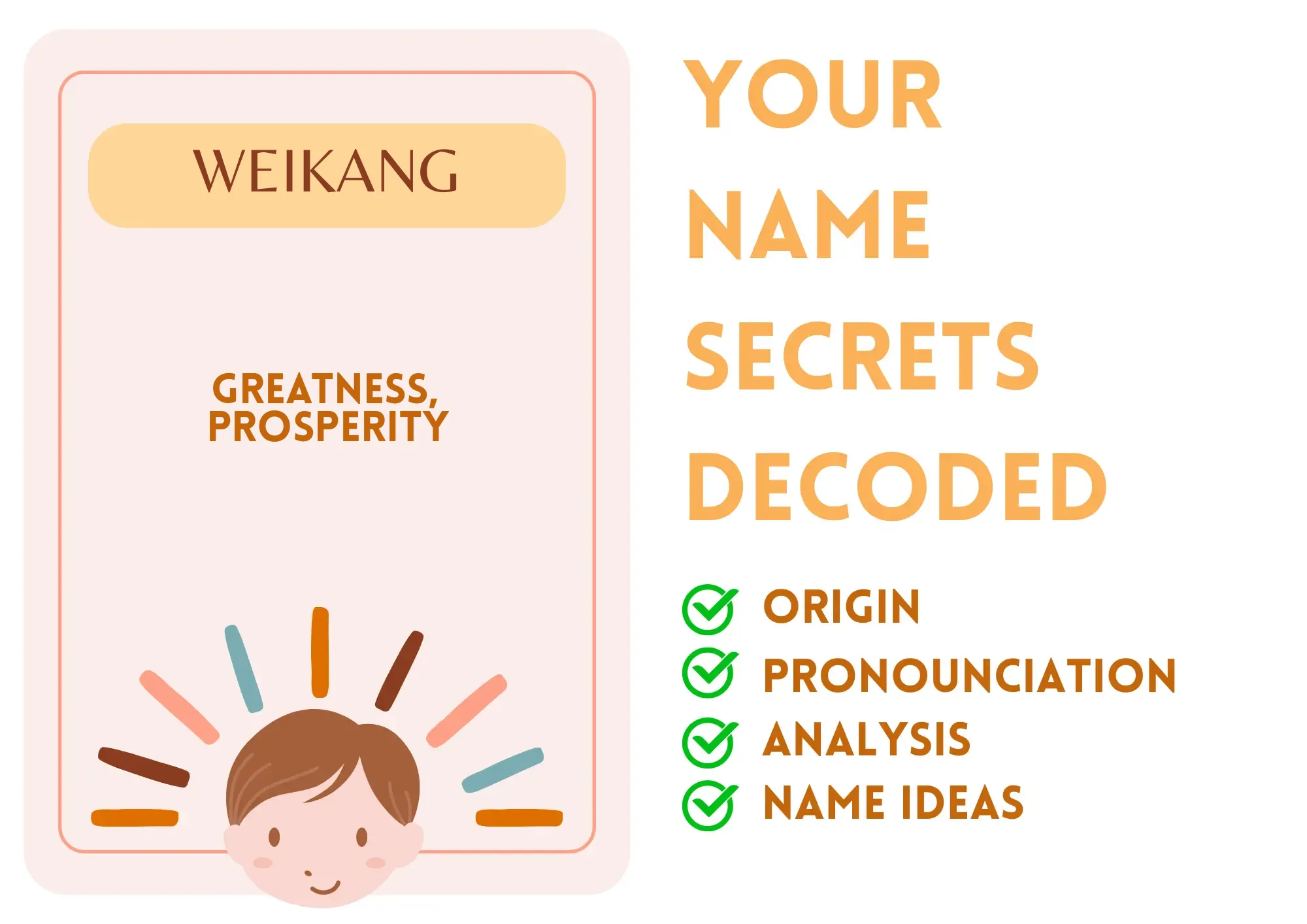
Weikang
Weikang is a name of Chinese origin, derived from characters that signify 'greatness' or 'prosperity.' It is predominantly a masculine name, symbolizing strength and health. In various contexts, it may represent auspiciousness and well-being, making it a favorable choice among families who wish to impart these qualities to their children.
People generally perceive Weikang positively, associating it with success, vitality, and good fortune. The name is easy to write and pronounce, with an aesthetic appeal that resonates across cultures.
While not widely featured in popular media, its cultural roots maintain significance, linking to traditional values of prosperity and health within the Chinese community. As a name, Weikang is appreciated for its melodious sound and meaningful essence, making it a proud choice for parents.
Basic Information
Gender: Boy
Sounds Like: WAY-kahng
Pronunciation Explanation: The first syllable 'We' is pronounced like 'way', and the second syllable 'kang' is pronounced with a nasal sound, similar to 'gong'.
Summary and Meaning
Meaning: greatness, prosperity
Origin: The name Weikang has Chinese origins and is often associated with values in Chinese culture that emphasize strength and wealth.
Usage: Weikang is traditionally a masculine name, though its characteristics could allow for unisex usage in less common scenarios.
Name Number (Chaldean)
Name Number (Pythagorean)
Popularity (Global Rank)
Overall: 100930
Boys: 54235
Most Popular in
Religious and Cultural Significance
Religion: Buddhism
Background: In the context of Chinese culture, Buddhism may play a role in the holistic view of prosperity and well-being, though the name itself is not overtly religious.
Cultural Significance: Weikang is culturally significant as it embodies virtues like strength, health, and positive attributes that are cherished in Chinese naming traditions.
Historical Significance: Historically, Weikang represents strength and prosperity, qualities valued throughout Chinese history and often sought after in lineage and offspring.
Popular Culture
Literature and Mythology: Though not widely featured in Western literature or mythology, the name may appear in Chinese folk tales or poetry that emphasize health and prosperity.
Movies and Television: Characters named Weikang might be found in Chinese television dramas or films, where they embody strength or success, but they are less prominent than characters with more common names.
Feelings and Perceptions
Perception: Weikang is viewed positively, often evoking feelings of hope, strength, and prosperity. It is considered a beautiful name with significant cultural reflections.
Positive Feelings: Strong, prosperous, healthy, hopeful, unique.
Negative Feelings: Some might find it challenging to pronounce or unfamiliar due to its specificity to Chinese culture.
Practical Considerations
Ease of Writing and Calling: Weikang is straightforward to write, composed of three syllables and easy to pronounce for English speakers, enhancing its appeal for use in diverse environments.
Common Typos and Misspellings: Weikang,Weikangh,Weightkang,Wecang
Common Nicknames: Wei,Kang,Kiki
Weikang Popularity
Weikang Usage and Popularity By Country
| Country | Rank (Overall) |
|---|---|
| Singapore | 8767 |
| Australia | 19888 |
| New Zealand | 20916 |
| Ireland | 23749 |
| Malaysia | 23931 |
| Netherlands | 34656 |
| Canada | 46968 |
| United Kingdom | 47276 |
| United States | 49819 |
| Germany | 51089 |
Weikang Usage and Popularity By City
| City | Rank (Overall) |
|---|---|
| Shanghai | 2764 |
| Wuhan | 689 |
| Seattle | 10668 |
| Melbourne | 17543 |
| London | 35343 |
| Tucson | 5177 |
| Sydney | 24786 |
| Peking | 9147 |
| San Jose | 7326 |
| Tempe | 2420 |
Compatibility Analysis
Famous Persons Named Weikang
No results found for Weikang.
Related Names
Similar Sounding Names:
Wekong,Wenkan,Weizhong,Weihong